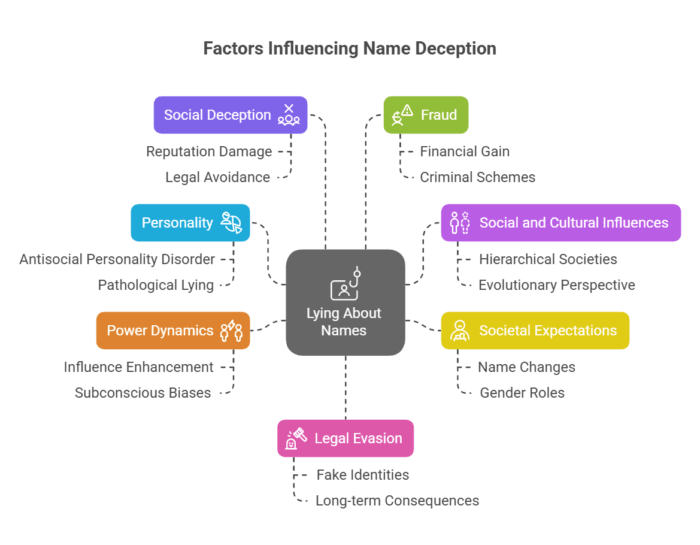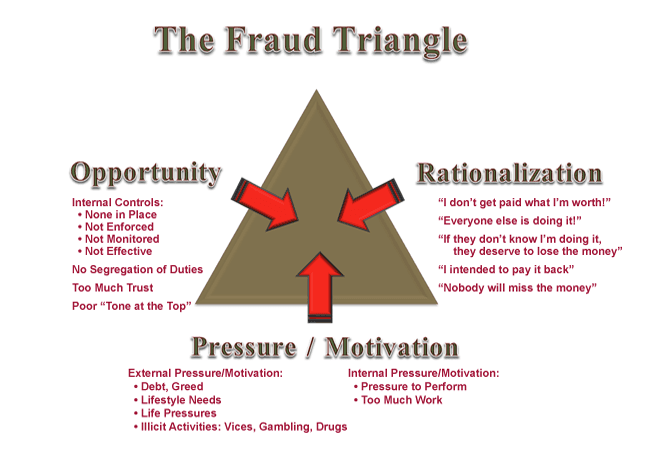
What if I told you that 1 in 5 people lie about their name at some point in their lives.
Whether it’s to dodge an awkward situation, avoid judgment, or even commit fraud, lying about a name is far more common than most of us realize.
Names are more than just labels—they’re tied to our identity, our relationships, and how we navigate the world. But when someone hides their true name, it’s often a sign of deeper psychological, social, or cultural forces at work.
This article dives into the reasons behind this behavior, exploring everything from self-protection and personality traits to societal pressures and legal risks.
By the end, you’ll not only understand why people lie about their names but also how these lies shape their lives and the lives of those around them.
Ready to uncover the secrets behind the deception?
Table of Contents
The Psychology of Lying About Names

At its core, lying is a deliberate act to mislead others. People might lie about their names to avoid punishment, gain rewards, or protect their privacy. But there’s more to it than meets the eye.
For some, lying about their name is a shield—a way to protect themselves from real or imagined threats. Imagine feeling like you’re constantly under a microscope.
Wouldn’t you want to hide behind a different identity to avoid judgment or danger? This self-protection instinct is a common driver behind many lies.
Others might lie to control a situation or avoid disappointing someone. Think of it like wearing a mask—it’s easier to manipulate how others see you when they don’t know the real you.
When and Why People Lie About Their Names

1- Personality
Personality also plays a role. People with conditions like Antisocial personality disorder or Borderline personality disorder are more likely to lie, including about their names.
Even personality traits like openness can lead to deception, especially if the goal is to protect someone else’s feelings.
Then there’s pathological lying—a habit of lying without a clear reason.
For some, lying about their name becomes second nature, almost like a reflex. Over time, this behavior can rewire the brain, making honesty feel foreign.
But here’s the kicker: lying doesn’t just hurt the person being deceived. It erodes trust, damages relationships, and can create a vicious cycle of deceit. Ever been lied to? It stings, doesn’t it?
Personality Traits and Likelihood to Lie
| Personality Trait | Likelihood to Lie About Names | Common Reasons |
|---|---|---|
| High Openness | Moderate | Protect others, avoid discomfort |
| Antisocial Personality | High | Manipulation, deceitful behavior |
| Borderline Personality | High | Fear of rejection, emotional instability |
| Low Self-Esteem | Moderate | Avoid criticism, gain acceptance |
2- Social and Cultural Influences
Names aren’t just labels—they’re powerful tools that shape how we see ourselves and how others see us. Social structures and cultural norms heavily influence whether someone lies about their name.
In hierarchical societies, lying about your name might help you climb the social ladder or avoid discrimination.
For example, someone might change their name to fit into a workplace culture or escape stereotypes tied to their ethnicity or background.
From an evolutionary perspective, deception helped early humans survive. Lying about your name could mean the difference between safety and danger.
Even today, these instincts linger, shaping how we navigate modern social dynamics.
3- Societal Expectations and Name Changes
From birth, our names become part of our identity. But societal expectations can pressure people to change or hide their names.
Think about it: names can trigger stereotypes. A name tied to a certain race, ethnicity, or socioeconomic class might lead to unfair judgments.
To avoid this, some people adopt new names to blend in or avoid bias.
Historically, name changes have been common. People might change their names to escape negative associations, boost confidence, or start fresh after a major life event. It’s like hitting the reset button on your identity.
Gender roles also come into play. Social role theory suggests that societal norms, not biology, shape how we behave.
This includes decisions about names whether to keep them, change them, or lie about them.
4- Power Dynamics and Deception
Deception is woven into the fabric of human interactions, especially when power is at play. Lying about your name can be a way to protect or enhance your influence.
In relationships, workplaces, or social circles, power imbalances can push people to lie.
For example, someone in a vulnerable position might use a fake name to establish boundaries or protect themselves.
But here’s the twist: power dynamics also shape our subconscious biases. These biases can make us more accepting of deception, even when it’s harmful. Recognizing and addressing these biases is key to creating environments where honesty thrives.
5- Social Deception
Social Contexts: Spreading false information about someone can ruin reputations. In some cases, the victim might sue for defamation.
The motivations vary. Some lie to avoid legal trouble, while others do it to gain control or protect their self-esteem. For some, it’s about managing low self-worth or denying a harsh reality.
6- Fraud and Name Deception
Fraud is a growing problem. In Canada alone, fraudsters stole $121 million in just one year. Lying about your name is often a key part of these schemes.
Fraud is a learned behavior, influenced by psychological and situational factors. Some lie for financial gain, while others do it to escape punishment.
Criminologist Donald Cressey’s fraud triangle explains why fraud happens: it requires opportunity, rationalization, and motivation.

7- The High Cost of Evading Legal Trouble
Using a fake name to dodge legal consequences is risky business. For example, using someone else’s credit card or presenting a fake ID can lead to felony charges.
The short-term benefits—like gaining access to restricted areas—might seem tempting. But the long-term consequences, including fines, jail time, and a criminal record, can derail your life.
Real-Life Examples of People Lying About Their Names
To better understand why people lie about their names, let’s look at some real-life examples.
Celebrities:
Many celebrities use stage names to create a unique brand.
For example, Elton John was born Reginald Dwight, but he changed his name to create a more memorable persona.
Authors:
Writers often use pen names to separate their personal lives from their professional work. J.K. Rowling
For example, used the pseudonym Robert Galbraith when writing crime novels.
Historical Figures:
Throughout history, many people have changed their names for political or personal reasons.
For example, Malcolm X changed his name to reject his slave name and embrace his African heritage.
The Impact of Technology on Name Changes
Technology has made it easier than ever for people to lie about their names.
Social media platforms, online forums, and dating apps allow users to create profiles using fake names, making it difficult to verify someone’s true identity.
Online Anonymity:
The internet provides a level of anonymity that encourages people to use fake names. This can be both a blessing and a curse, as it allows people to express themselves freely but also makes it easier for malicious actors to deceive others.
Digital Footprints:
While technology makes it easy to lie about one’s name, it also creates a digital footprint that can be difficult to erase. Even if someone changes their name online, their past actions may still be traceable.
How to Detect if Someone is Lying About Their Name
Detecting if someone is lying about their name can be challenging, but there are some signs to look out for.
Inconsistencies: If someone’s story doesn’t add up or if there are inconsistencies in their personal details, it may be a sign that they’re lying about their name.
Lack of Documentation: People who lie about their names often have difficulty providing official documentation, such as a driver’s license or passport, to verify their identity.
Behavioral Cues: Pay attention to behavioral cues, such as nervousness or evasiveness, when someone is asked about their name or personal history.
Lying about your name isn’t just a simple act—it’s a complex web of psychological, social, and cultural factors. Whether it’s to protect yourself, gain power, or fit in, the reasons are deeply human.
But here’s the question: is the temporary relief of lying worth the long-term damage it can cause?
Lying about a name might seem like a harmless act, but it’s rarely as simple as it appears. From psychological motivations like self-protection and pathological lying to the influence of societal norms and power dynamics, the reasons are complex and deeply rooted.
We’ve explored how names shape our identity, how social structures push people to deceive, and how even small lies can lead to big consequences-like legal trouble or broken trust.
The truth is, every lie has a cost, and understanding why we lie can help us make better choices.
So, the next time you’re tempted to hide behind a false name, ask yourself: What am I really protecting, and is it worth the risk?
Honesty isn’t just about telling the truth, it’s about building trust and authenticity in a world that often rewards deception. What kind of world do you want to live in, one built on lies or one grounded in truth?
FAQs:
Q: Why do people lie about their names?
A: People often lie about their names to protect themselves, avoid judgment, or fit into social or professional settings. It’s usually tied to self-preservation or societal pressures.
Q: Can lying about your name have serious consequences?
A: Yes! Using a fake name can lead to legal trouble, damaged relationships, or even criminal charges like fraud or defamation.
Q: Are certain personality types more likely to lie about their names?
A: Absolutely. People with traits like openness or disorders like Antisocial Personality Disorder are more prone to lying, including about their names.
Q: How do societal expectations influence lying about names?
A: Societal norms and stereotypes can push people to change or hide their names to avoid discrimination or fit into cultural expectations.
Q: What should I do if someone lies to me about their name?
A: Approach the situation with curiosity, not judgment. Ask why they felt the need to lie, it might reveal deeper insecurities or pressures they’re facing.

